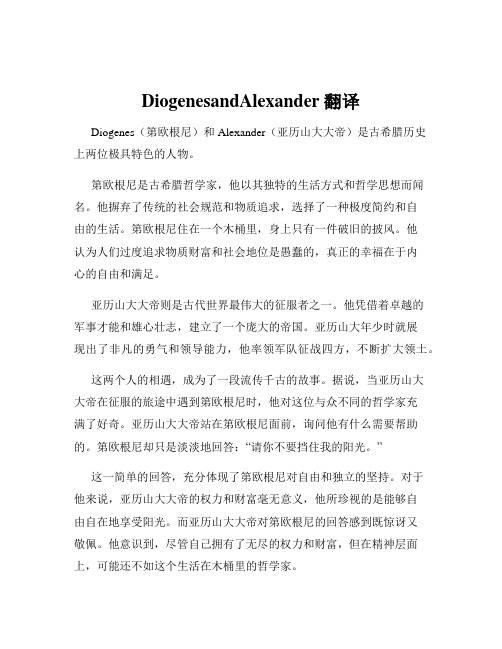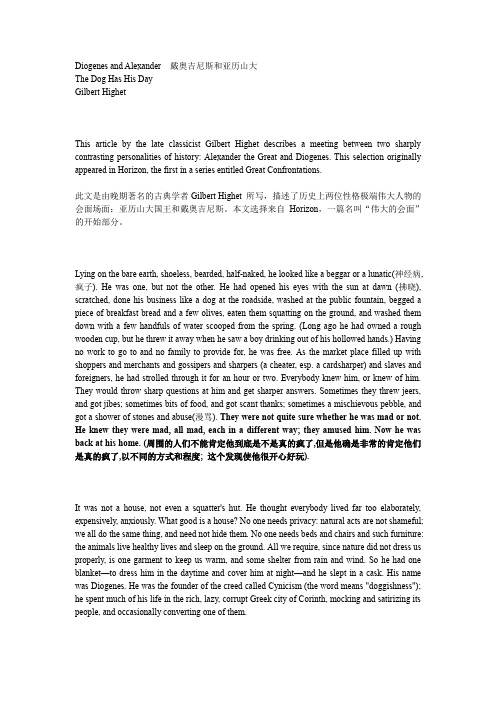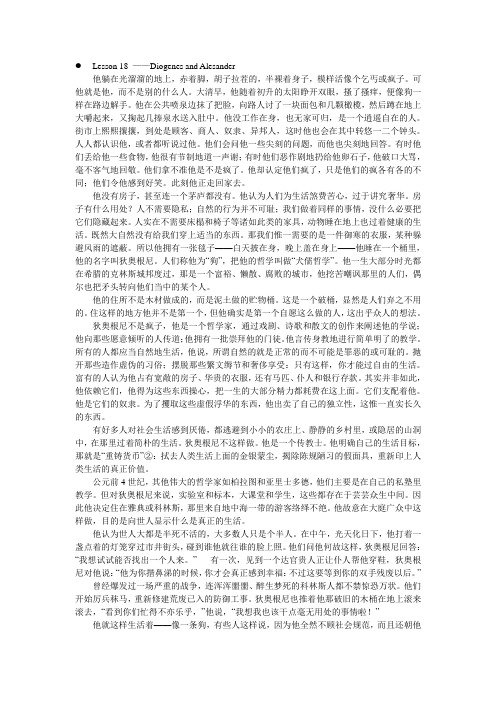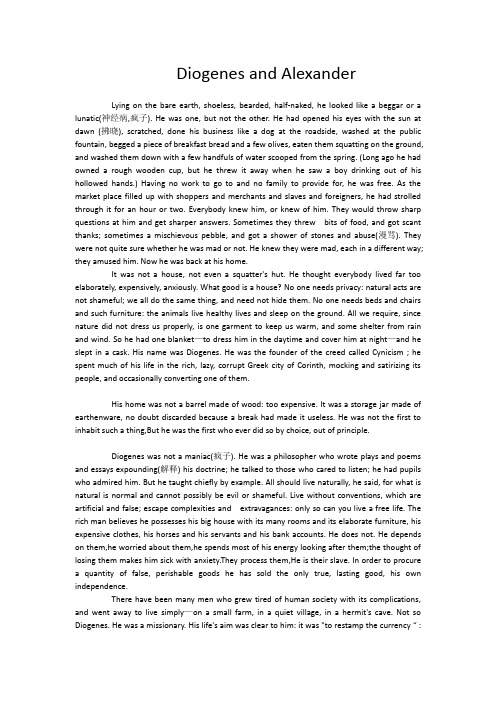Diogenes_and_Alexander 2
diogenes and alexander 课文翻译

diogenes and alexander 课文翻译“Diogenes and Alexander” is a famous story about the ancient Greek philosopher Diogenes andthe Macedonian king Alexander. The story has been repeated since antiquity and is believed to have originated in the writings of Plutarch, although some scholars suggest that it could have originated in the works of Aesop or Xenophon.The story goes as follows: One day, Alexander the Great went to visit the renowned philosopher Diogenes of Sinope and found him resting in the sunlight. Alexander asked if there was any favor he could do for Diogenes, to which the philosopher replied, “Yes, stand out of my light.”Alexander was so impressed with this reply that he said, “If I were not Alexander, I would be Diogenes.” To which Diogenes replied, “If I were not Diogenes, I would still be Diogenes.”This story has become a popular parable in Western culture because of its depiction of the two figures. It shows how Alexander, who was known for his power and ambition, humbled himself in front of the philosopher and admired his wisdom and wit. On the other hand, it also shows how Diogenes, despite his simplicity and lack of material possessions, was still content with the life he had chosen for himself.In this way, the story serves as an example of the importance of living a life of virtue and moderation over one of wealth and power. It reminds us that our character and wisdom are more important than what we own or how much power we possess.In Chinese culture, the story of Diogenes and Alexander is often used as an allegory toillustrate the contrast between the Confucian ideal of cultivating one's character, and the Daoistideal of living in harmony with nature. This interpretation ties in with the traditional Chinese view that morality comes from self-cultivation and not from external rewards or punishments.In summation, the story of Diogenes and Alexander is a timeless classic that can be interpreted in many different ways. Its lessons of humility and moderation are valuable for people of all ages and cultures, and can help us remember to focus on the things that truly matter in life.。
DiogenesandAlexander翻译

DiogenesandAlexander翻译Diogenes(第欧根尼)和 Alexander(亚历山大大帝)是古希腊历史上两位极具特色的人物。
第欧根尼是古希腊哲学家,他以其独特的生活方式和哲学思想而闻名。
他摒弃了传统的社会规范和物质追求,选择了一种极度简约和自由的生活。
第欧根尼住在一个木桶里,身上只有一件破旧的披风。
他认为人们过度追求物质财富和社会地位是愚蠢的,真正的幸福在于内心的自由和满足。
亚历山大大帝则是古代世界最伟大的征服者之一。
他凭借着卓越的军事才能和雄心壮志,建立了一个庞大的帝国。
亚历山大年少时就展现出了非凡的勇气和领导能力,他率领军队征战四方,不断扩大领土。
这两个人的相遇,成为了一段流传千古的故事。
据说,当亚历山大大帝在征服的旅途中遇到第欧根尼时,他对这位与众不同的哲学家充满了好奇。
亚历山大大帝站在第欧根尼面前,询问他有什么需要帮助的。
第欧根尼却只是淡淡地回答:“请你不要挡住我的阳光。
”这一简单的回答,充分体现了第欧根尼对自由和独立的坚持。
对于他来说,亚历山大大帝的权力和财富毫无意义,他所珍视的是能够自由自在地享受阳光。
而亚历山大大帝对第欧根尼的回答感到既惊讶又敬佩。
他意识到,尽管自己拥有了无尽的权力和财富,但在精神层面上,可能还不如这个生活在木桶里的哲学家。
第欧根尼的哲学思想对后世产生了深远的影响。
他的简约生活理念提醒着人们,不要被物质的欲望所迷惑,要追求内心的平静和真实的自我。
在当今社会,人们常常为了追求物质上的享受而忙碌奔波,忽略了内心的需求。
第欧根尼的故事让我们反思,是否我们所追求的东西真的能给我们带来幸福。
亚历山大大帝的征服之旅虽然充满了辉煌和成就,但也带来了战争的破坏和人民的苦难。
然而,从另一个角度来看,他的征服也促进了不同文化之间的交流与融合。
亚历山大大帝的帝国涵盖了众多不同的民族和文化,这种多元性在一定程度上推动了文明的发展。
第欧根尼和亚历山大大帝的对比,让我们看到了两种截然不同的价值观和生活方式。
大学英语(四)Diogenes_and_Alexander__戴奥吉尼斯和亚历山大

Diogenes and Alexander 戴奥吉尼斯和亚历山大The Dog Has His DayGilbert HighetThis article by the late classicist Gilbert Highet describes a meeting between two sharply contrasting personalities of history: Alexander the Great and Diogenes. This selection originally appeared in Horizon, the first in a series entitled Great Confrontations.此文是由晚期著名的古典学者Gilbert Highet 所写,描述了历史上两位性格极端伟大人物的会面场面:亚历山大国王和戴奥吉尼斯。
本文选择来自Horizon,一篇名叫“伟大的会面”的开始部分。
Lying on the bare earth, shoeless, bearded, half-naked, he looked like a beggar or a lunatic(神经病,疯子). He was one, but not the other. He had opened his eyes with the sun at dawn (拂晓), scratched, done his business like a dog at the roadside, washed at the public fountain, begged a piece of breakfast bread and a few olives, eaten them squatting on the ground, and washed them down with a few handfuls of water scooped from the spring. (Long ago he had owned a rough wooden cup, but he threw it away when he saw a boy drinking out of his hollowed hands.) Having no work to go to and no family to provide for, he was free. As the market place filled up with shoppers and merchants and gossipers and sharpers (a cheater, esp. a cardsharper) and slaves and foreigners, he had strolled through it for an hour or two. Everybody knew him, or knew of him. They would throw sharp questions at him and get sharper answers. Sometimes they threw jeers, and got jibes; sometimes bits of food, and got scant thanks; sometimes a mischievous pebble, and got a shower of stones and abuse(漫骂). They were not quite sure whether he was mad or not. He knew they were mad, all mad, each in a different way; they amused him. Now he was back at his home. (周围的人们不能肯定他到底是不是真的疯了,但是他确是非常的肯定他们是真的疯了,以不同的方式和程度; 这个发现使他很开心好玩).It was not a house, not even a squatter's hut. He thought everybody lived far too elaborately, expensively, anxiously. What good is a house? No one needs privacy: natural acts are not shameful; we all do the same thing, and need not hide them. No one needs beds and chairs and such furniture: the animals live healthy lives and sleep on the ground. All we require, since nature did not dress us properly, is one garment to keep us warm, and some shelter from rain and wind. So he had one blanket—to dress him in the daytime and cover him at night—and he slept in a cask. His name was Diogenes. He was the founder of the creed called Cynicism (the word means "doggishness"); he spent much of his life in the rich, lazy, corrupt Greek city of Corinth, mocking and satirizing its people, and occasionally converting one of them.His home was not a barrel made of wood: too expensive. It was a storage jar made of earthenware, something like a modern fuel tank—no doubt discarded because a break had made it useless. He was not the first to inhabit such a thing: the refugees driven into Athens by the Spartan invasion had been forced to sleep in casks. But he was the first who ever did so by choice, out of principle.Diogenes was not a degenerate or a maniac(疯子). He was a philosopher who wrote plays and poems and essays expounding(解释) his doctrine; he talked to those who cared to listen; he had pupils who admired him. But he taught chiefly by example. All should live naturally, he said, for what is natural is normal and cannot possibly be evil or shameful. Live without conventions, which are artificial and false; escape complexities and superfluities and extravagances: only so can you live a free life. The rich man believes he possesses his big house with its many rooms and its elaborate furniture, his pictures and expensive clothes, his horses and his servants and his bank accounts. He does not. He is their slave. In order to procure a quantity of false, perishable goods he has sold the only true, lasting good, his own independence. (富人们都相信, 拥有了属于自己的豪华大房子,房间很多,装饰和家具都很精致和气派, 还有很多的名画和很昂贵的衣服, 马匹和佣人,还有银行账户上的很多的钱。
Diogenes and Alexander 翻译

Lesson 18 ——Diogenes and Alesander他躺在光溜溜的地上,赤着脚,胡子拉茬的,半裸着身子,模样活像个乞丐或疯子。
可他就是他,而不是别的什么人。
大清早,他随着初升的太阳睁开双眼,搔了搔痒,便像狗一样在路边解手。
他在公共喷泉边抹了把脸,向路人讨了一块面包和几颗橄榄,然后蹲在地上大嚼起来,又掬起几捧泉水送入肚中。
他没工作在身,也无家可归,是一个逍遥自在的人。
街市上熙熙攘攘,到处是顾客、商人、奴隶、异邦人,这时他也会在其中转悠一二个钟头。
人人都认识他,或者都听说过他。
他们会问他一些尖刻的问题,而他也尖刻地回答。
有时他们丢给他一些食物,他很有节制地道一声谢;有时他们恶作剧地扔给他卵石子,他破口大骂,毫不客气地回敬。
他们拿不准他是不是疯了。
他却认定他们疯了,只是他们的疯各有各的不同;他们令他感到好笑。
此刻他正走回家去。
他没有房子,甚至连一个茅庐都没有。
他认为人们为生活煞费苦心,过于讲究奢华。
房子有什么用处?人不需要隐私;自然的行为并不可耻;我们做着同样的事情,没什么必要把它们隐藏起来。
人实在不需要床榻和椅子等诸如此类的家具,动物睡在地上也过着健康的生活。
既然大自然没有给我们穿上适当的东西。
那我们惟一需要的是一件御寒的衣服,某种躲避风雨的遮蔽。
所以他拥有一张毯子——白天披在身,晚上盖在身上——他睡在一个桶里,他的名字叫狄奥根尼。
人们称他为“狗”,把他的哲学叫做“犬儒哲学”。
他一生大部分时光都在希腊的克林斯城邦度过,那是一个富裕、懒散、腐败的城市,他挖苦嘲讽那里的人们,偶尔也把矛头转向他们当中的某个人。
他的住所不是木材做成的,而是泥土做的贮物桶。
这是一个破桶,显然是人们弃之不用的。
住这样的地方他并不是第一个,但他确实是第一个自愿这么做的人,这出乎众人的想法。
狄奥根尼不是疯子,他是一个哲学家,通过戏剧、诗歌和散文的创作来阐述他的学说;他向那些愿意倾听的人传道;他拥有一批崇拜他的门徒。
现代大学英语-精读3-Diogenes-and-Alexander-原文

Diogenes and AlexanderLying on the bare earth, shoeless, bearded, half-naked, he looked like a beggar or a lunatic(神经病,疯子). He was one, but not the other. He had opened his eyes with the sun at dawn (拂晓), scratched, done his business like a dog at the roadside, washed at the public fountain, begged a piece of breakfast bread and a few olives, eaten them squatting on the ground, and washed them down with a few handfuls of water scooped from the spring. (Long ago he had owned a rough wooden cup, but he threw it away when he saw a boy drinking out of his hollowed hands.) Having no work to go to and no family to provide for, he was free. As the market place filled up with shoppers and merchants and slaves and foreigners, he had strolled through it for an hour or two. Everybody knew him, or knew of him. They would throw sharp questions at him and get sharper answers. Sometimes they threw bits of food, and got scant thanks; sometimes a mischievous pebble, and got a shower of stones and abuse(漫骂). They were not quite sure whether he was mad or not. He knew they were mad, each in a different way; they amused him. Now he was back at his home.It was not a house, not even a squatter's hut. He thought everybody lived far too elaborately, expensively, anxiously. What good is a house? No one needs privacy: natural acts are not shameful; we all do the same thing, and need not hide them. No one needs beds and chairs and such furniture: the animals live healthy lives and sleep on the ground. All we require, since nature did not dress us properly, is one garment to keep us warm, and some shelter from rain and wind. So he had one blanket—to dress him in the daytime and cover him at night—and he slept in a cask. His name was Diogenes. He was the founder of the creed called Cynicism ; he spent much of his life in the rich, lazy, corrupt Greek city of Corinth, mocking and satirizing its people, and occasionally converting one of them.His home was not a barrel made of wood: too expensive. It was a storage jar made of earthenware, no doubt discarded because a break had made it useless. He was not the first to inhabit such a thing,But he was the first who ever did so by choice, out of principle.Diogenes was not a maniac(疯子). He was a philosopher who wrote plays and poems and essays expounding(解释) his doctrine; he talked to those who cared to listen; he had pupils who admired him. But he taught chiefly by example. All should live naturally, he said, for what is natural is normal and cannot possibly be evil or shameful. Live without conventions, which are artificial and false; escape complexities and extravagances: only so can you live a free life. The rich man believes he possesses his big house with its many rooms and its elaborate furniture, his expensive clothes, his horses and his servants and his bank accounts. He does not. He depends on them,he worried about them,he spends most of his energy looking after them;the thought of losing them makes him sick with anxiety.They process them,He is their slave. In order to procure a quantity of false, perishable goods he has sold the only true, lasting good, his own independence.There have been many men who grew tired of human society with its complications, and went away to live simply—on a small farm, in a quiet village, in a hermit's cave. Not so Diogenes. He was a missionary. His life's aim was clear to him: it was "to restamp the currency “ :to take the clean metal of human life, to erase the old false conventional markings, and to imprint it with its true values.The other great philosophers of the fourth century BC,such as Plato and Aristotle, taught mainly their own private pupils.But for Diogenes, laboratory and specimens and lecture halls and pupils were all to be found in a crowd of ordinary people. Therefore, he chose to live in Athens or Corinth, where travelers from all over the Mediterranean world constantly came and went. And, by design, he publicly behaved in such ways as to show people what real life was.He thought most people were only half-alive, most men only half-men. At bright noonday he walked through the market place carrying a lighted lamp and inspecting the face of everyone he met. They asked him why. Diogenes answered, "I am trying to find a man."To a gentleman whose servant was putting on his shoes for him, Diogenes said, "You won't be really happy until he wipes your nose for you: that will come after you lose the use of your hands."Once there was a war scare so serious that it stirred even the lazy, profit-happy Corinthians. They began to drill, clean their weapons, and rebuild their neglected fortifications. Diogenes took his old cask and began to roll it up and down, back and forward. "When you are all so busy," he said, "I felt I ought to do something!"And so he lived—like a dog, some said, because he cared nothing for conventions of society, and because he showed his teeth and barked at those he disliked. Now he was lying in the sunlight, contented and happy, happier than the Shah of Persia. Although he knew he was going to have an important visitor, he would not move.The little square began to fill with people. Page boys , soldiers,secretaries, officers, diplomats, they all gradually formed a circle centered around Diogenes. He looked them over as a sober man looks at a crowd of tottering drunks, and shook his head. He knew who they were. They were the servants of Alexander, the conqueror of Greece, the Macedonian king, who was visiting his new realm.Only twenty, Alexander was far older and wiser than his years. Like all Macedonians he loved drinking, but he could usually handle it; and toward women he was nobly restrained and chivalrous. Like all Macedonians he loved fighting; he was a magnificent commander, but he was not merely a military automaton. He could think. At thirteen he had become a pupil of the greatest mind in Greece, Aristotle. who gave him the best of Greek culture. He taught Alexander poetry; the young prince slept with the Iliad under his pillow and longed to emulate Achilles, who brought the mighty power of Asia to ruin. He taught him philosophy, in particular the shapes and uses of political power and he taught him the principles of scientific research, and shipped hundreds of zoological specimens back to Greece for study. Indeed, it was from Aristotle that Alexander learned to seek out everything strange which might be instructive.Now, Alexander was in Corinth to take command of the League of Greek States which his father Philip created. He was welcomed and honored and flattered. He was the man of thehour, of the century; he was unanimously appointed commander-in-chief of a new expedition against old, rich, corrupt Asia. Nearly everyone crowded to Corinth in order to congratulate him, to seek employment with him.Only Diogenes, although he lived in Corinth, did not visit the new monarch. With that generosity which Aristotle had taught him, Alexander determined to call upon Diogenes.With his handsome face, his fiery glance, his strong supple body, his purple and gold cloak, and his air of destiny, he moved through the parting crowd, toward the Dog's kennel. When a king approaches, all rise in respect. Diogenes merely sat up on one elbow. When a monarch enters a place, all greet him with a bow or an acclamation. Diogenes said nothing.There was a silence. Alexander spoke first, with a kindly greeting. Looking at the poor broken cask, the single ragged garment, and the rough figure lying on the ground, he said, "Is there anything I can do for you, Diogenes?""Yes," said the Dog. "Stand to one side. You're blocking the sunlight."There was an amazed silence. Slowly, Alexander turned away. A titter broke out from the elegant Greeks. The Macedonian officers, after deciding that Diogenes was not worth the trouble of kicking, were starting to guffaw and nudge one another. Alexander was still silent. To those nearest him he said quietly, "If I were not Alexander, I should be Diogenes." They took it as a paradox.But Alexander meant it. He understood Cynicism as the others could not.He was what Diogenes called himself, a "citizen of the world." Like Diogenes, he admired the heroic figure of Hercules, who labored to help mankind while all others toiled and sweated only for themselves. He knew that of all men then alive in the world only Alexander the conqueror and Diogenes the beggar were free.。
Diogenes and Alexander 翻译

Diogenes and Alexander 翻译众所周知,古代希腊哲学家戴奥吉尼斯(Diogenes)和亚历山大大帝(Alexander the Great)之间的故事至今令人津津乐道。
这两位历史人物代表着两种截然不同的生活哲学和价值观。
本文将对双方进行比较,并探讨他们之间的冲突与共通之处。
戴奥吉尼斯是斯多亚学派的一位知名哲学家,他主张简朴和自由,追求真实的快乐和自足。
与之不同的是,亚历山大大帝则是一位伟大的军事统帅和征服者,他寻求权力和荣誉,追求辉煌的胜利。
据说,戴奥吉尼斯和亚历山大大帝在公元前4世纪曾有过一次非常有趣的碰面。
亚历山大大帝自称为世界君主,自诩为神的后裔。
他对自己的成就感到自豪,并迫切希望戴奥吉尼斯也承认他的卓越地位。
于是,在一次风和日丽的午后,亚历山大大帝找到了坐在街边的戴奥吉尼斯。
他向戴奥吉尼斯问好,并大声宣称:“戴奥吉尼斯,我是世界君主亚历山大!我拥有整个世界,我可以成为你的宝贝。
”然而,戴奥吉尼斯却毫不在意,慢悠悠地抬起头看着亚历山大大帝,然后轻描淡写地回答道:“抱歉,我现在正忙着看着我的专属太阳,你能稍后再来找我吗?”亚历山大大帝对戴奥吉尼斯的不屑一顾感到震惊,他无法理解这样一个平凡的人为何对他的伟大和荣耀如此漠不关心。
于是,亚历山大大帝压抑住内心的愤怒,耐心地问戴奥吉尼斯:“如果你不是忙于凝视太阳的话,你有什么要求吗?我可以满足你的愿望。
”戴奥吉尼斯幽默地回答道:“是的,如果你能站到一边,不挡住我的阳光,那我就满足了。
”这个寓言般的对话,精确地表达了戴奥吉尼斯的价值观。
他拒绝在亚历山大大帝面前低头,表达了对权力和军事胜利的淡薄态度。
相比之下,亚历山大大帝则展现了他的自尊心和对控制他人的渴望。
然而,尽管双方的价值观存在冲突,他们之间也有一些共通之处。
首先,二者都扮演了当时精神与行动的引领者的角色,无论是探索哲学真理还是征服世界,都在各自的领域内有着卓越的成就。
此外,戴奥吉尼斯和亚历山大大帝都是被后世仰慕的伟人,他们的故事激励着人们去思考和追寻更高的目标。
Diogenes and Alexander第奥真尼斯和亚历山大大帝

亚历山大大帝
33岁去世 建立帝国 20岁继承王位 33岁去世
建立帝国
13岁随父出征
著名的军事家和政治家
他足智多谋,智勇双全,在11年的奋战中,他从 未打过一次败仗。 在担任马其顿国王的短短13年中,以其雄才大略。 东征西讨,先是确立了在全希腊的统治地位,后 又灭亡了波斯帝国。在横跨欧、亚的辽阔土地上, 建立起了亚历山大帝国。创下了前无古人的辉煌 业绩,促进了东西方文化的交流和经济的发展, 对人类社会的进展产生了重大的影响。
Alexander the Great
古代马其顿国王,亚历山大帝国皇帝 世界古代史上著名的军事家和政治家 亚里士多德的学生之一 人物死因及人物评论
Alexander III 亚历山大大帝(公元前 356-前323年),古 代马其顿国王,亚历山 大帝国皇帝,世界古代 史上著名的军事家和政 治家。 古代马其顿国王腓力二 世之子。 亚里士多德的学生之一。
激光照 射说
相关名言
The mountain don't come to me, I went to it
If I were not Alexander, then I should wish to be Diogenes.
I would not fear a pack of lions led by a sheep, but I would always fear a flock of sheep led by a lion.
实十分富有戏剧性,有关他的名字就有许多种传说。作为战士,他智勇双全; 作为将军,他无与伦比。在11年的奋战中,他从未打过一次败仗;当时记载 普遍相信亚历山大是天神宙斯之子,在亚历山大出世之前,奥林匹娅斯梦见雷 电,而派拉市区则有一座女神殿失火焚毁,附近人心惶惶,几个占卜师都说是 大灾难来临的前兆,此时有一人却说:“女神殿的焚毁日,已有一个男孩在同 日诞生,此儿以后将要灭亡全亚洲。”
现代大学英语 精读3 Diogenes and Alexander 原文

Diogenes and AlexanderLying on the bare earth, shoeless, bearded, half-naked, he looked like a beggar or a lunatic(神经病,疯子). He was one, but not the other. He had opened his eyes with the sun at dawn (拂晓), scratched, done his business like a dog at the roadside, washed at the public fountain, begged a piece of breakfast bread and a few olives, eaten them squatting on the ground, and washed them down with a few handfuls of water scooped from the spring. (Long ago he had owned a rough wooden cup, but he threw it away when he saw a boy drinking out of his hollowed hands.) Having no work to go to and no family to provide for, he was free. As the market place filled up with shoppers and merchants and slaves and foreigners, he had strolled through it for an hour or two. Everybody knew him, or knew of him. They would throw sharp questions at him and get sharper answers. Sometimes they threw bits of food, and got scant thanks; sometimes a mischievous pebble, and got a shower of stones and abuse(漫骂). They were not quite sure whether he was mad or not. He knew they were mad, each in a different way; they amused him. Now he was back at his home.It was not a house, not even a squatter's hut. He thought everybody lived far too elaborately, expensively, anxiously. What good is a house? No one needs privacy: natural acts are not shameful; we all do the same thing, and need not hide them. No one needs beds and chairs and such furniture: the animals live healthy lives and sleep on the ground. All we require, since nature did not dress us properly, is one garment to keep us warm, and some shelter from rain and wind. So he had one blanket—to dress him in the daytime and cover him at night—and he slept in a cask. His name was Diogenes. He was the founder of the creed called Cynicism ; he spent much of his life in the rich, lazy, corrupt Greek city of Corinth, mocking and satirizing its people, and occasionally converting one of them.His home was not a barrel made of wood: too expensive. It was a storage jar made of earthenware, no doubt discarded because a break had made it useless. He was not the first to inhabit such a thing,But he was the first who ever did so by choice, out of principle.Diogenes was not a maniac(疯子). He was a philosopher who wrote plays and poems and essays expounding(解释) his doctrine; he talked to those who cared to listen; he had pupils who admired him. But he taught chiefly by example. All should live naturally, he said, for what is natural is normal and cannot possibly be evil or shameful. Live without conventions, which are artificial and false; escape complexities and extravagances: only so can you live a free life. The rich man believes he possesses his big house with its many rooms and its elaborate furniture, his expensive clothes, his horses and his servants and his bank accounts. He does not. He depends on them,he worried about them,he spends most of his energy looking after them;the thought of losing them makes him sick with anxiety.They process them,He is their slave. In order to procure a quantity of false, perishable goods he has sold the only true, lasting good, his own independence.There have been many men who grew tired of human society with its complications, and went away to live simply—on a small farm, in a quiet village, in a hermit's cave. Not so Diogenes. He was a missionary. His life's aim was clear to him: it was "to restamp the currency “ : to take theclean metal of human life, to erase the old false conventional markings, and to imprint it with its true values.The other great philosophers of the fourth century BC,such as Plato and Aristotle, taught mainly their own private pupils.But for Diogenes, laboratory and specimens and lecture halls and pupils were all to be found in a crowd of ordinary people. Therefore, he chose to live in Athens or Corinth, where travelers from all over the Mediterranean world constantly came and went. And, by design, he publicly behaved in such ways as to show people what real life was.He thought most people were only half-alive, most men only half-men. At bright noonday he walked through the market place carrying a lighted lamp and inspecting the face of everyone he met. They asked him why. Diogenes answered, "I am trying to find a man."To a gentleman whose servant was putting on his shoes for him, Diogenes said, "You won't be really happy until he wipes your nose for you: that will come after you lose the use of your hands."Once there was a war scare so serious that it stirred even the lazy, profit-happy Corinthians. They began to drill, clean their weapons, and rebuild their neglected fortifications. Diogenes took his old cask and began to roll it up and down, back and forward. "When you are all so busy," he said, "I felt I ought to do something!"And so he lived—like a dog, some said, because he cared nothing for conventions of society, and because he showed his teeth and barked at those he disliked. Now he was lying in the sunlight, contented and happy, happier than the Shah of Persia. Although he knew he was going to have an important visitor, he would not move.The little square began to fill with people. Page boys , soldiers,secretaries, officers, diplomats, they all gradually formed a circle centered around Diogenes. He looked them over as a sober man looks at a crowd of tottering drunks, and shook his head. He knew who they were. They were the servants of Alexander, the conqueror of Greece, the Macedonian king, who was visiting his new realm.Only twenty, Alexander was far older and wiser than his years. Like all Macedonians he loved drinking, but he could usually handle it; and toward women he was nobly restrained and chivalrous. Like all Macedonians he loved fighting; he was a magnificent commander, but he was not merely a military automaton. He could think. At thirteen he had become a pupil of the greatest mind in Greece, Aristotle. who gave him the best of Greek culture. He taught Alexander poetry; the young prince slept with the Iliad under his pillow and longed to emulate Achilles, who brought the mighty power of Asia to ruin. He taught him philosophy, in particular the shapes and uses of political power and he taught him the principles of scientific research, and shipped hundreds of zoological specimens back to Greece for study. Indeed, it was from Aristotle that Alexander learned to seek out everything strange which might be instructive.Now, Alexander was in Corinth to take command of the League of Greek States which his father Philip created. He was welcomed and honored and flattered. He was the man of the hour, of the century; he was unanimously appointed commander-in-chief of a new expedition againstold, rich, corrupt Asia. Nearly everyone crowded to Corinth in order to congratulate him, to seek employment with him.Only Diogenes, although he lived in Corinth, did not visit the new monarch. With that generosity which Aristotle had taught him, Alexander determined to call upon Diogenes.With his handsome face, his fiery glance, his strong supple body, his purple and gold cloak, and his air of destiny, he moved through the parting crowd, toward the Dog's kennel. When a king approaches, all rise in respect. Diogenes merely sat up on one elbow. When a monarch enters a place, all greet him with a bow or an acclamation. Diogenes said nothing.There was a silence. Alexander spoke first, with a kindly greeting. Looking at the poor broken cask, the single ragged garment, and the rough figure lying on the ground, he said, "Is there anything I can do for you, Diogenes?""Yes," said the Dog. "Stand to one side. You're blocking the sunlight."There was an amazed silence. Slowly, Alexander turned away. A titter broke out from the elegant Greeks. The Macedonian officers, after deciding that Diogenes was not worth the trouble of kicking, were starting to guffaw and nudge one another. Alexander was still silent. To those nearest him he said quietly, "If I were not Alexander, I should be Diogenes." They took it as a paradox.But Alexander meant it. He understood Cynicism as the others could not.He was what Diogenes called himself, a "citizen of the world." Like Diogenes, he admired the heroic figure of Hercules, who labored to help mankind while all others toiled and sweated only for themselves. He knew that of all men then alive in the world only Alexander the conqueror and Diogenes the beggar were free.仅供个人用于学习、研究;不得用于商业用途。
- 1、下载文档前请自行甄别文档内容的完整性,平台不提供额外的编辑、内容补充、找答案等附加服务。
- 2、"仅部分预览"的文档,不可在线预览部分如存在完整性等问题,可反馈申请退款(可完整预览的文档不适用该条件!)。
- 3、如文档侵犯您的权益,请联系客服反馈,我们会尽快为您处理(人工客服工作时间:9:00-18:30)。
• • •
• • • • • •
•
• • • • •
Reign:336–323 BC Full name: Alexander III of Macedon Titles: King of Macedon Hegemon of the Hellenic League Shahanshah of Persia Pharaoh of Egypt Lord of Asia Born: 20 or 21 July 356 BC Birthplace: Pella, Macedon Died:10 or 11 June 323 BC (aged 32) Place of death: Babylon Predecessor: Philip II of Macedon Successor:Alexander IV of Macedon Philip III of Macedon Wives: Roxana of Bactria Stateira II of Persia Parysatis II of Persia Offspring: Alexander IV of Macedon Dynasty: Argead dynasty Father: Philip II of Macedon Mother: Olympias of Epirus Religious beliefs: Greek polythgenes------in Corinth['kɔrinθ]
• According to a story, After being captured by pirates 海 盗and sold into slavery, Diogenes eventually settled in Corinth. There he passed his philosophy of Cynicism to Crates克拉底, who taught it to Zeno季诺, who fashioned it into the school of Stoicism斯 多亚学派, one of the most enduring schools of Greek philosophy.
1. Diogenes -----in Corinth
Diogenes made a virtue of poverty. He begged for a living and slept in a tub桶 in the marketplace. He became notorious for his philosophical stunts表演,噱头 such as carrying a lamp in the daytime, claiming to be looking for an honest man. He publicly mocked Alexander. He embarrassed Plato, disputed his interpretation of Socrates苏 格拉底 and sabotaged搞破坏 his lectures.
2. Alexander
In 340 BC, when Philip assembled a large Macedonian army and invaded Thrace色雷斯 , he left his 16-year- old son with the power to rule Macedonia in his absence as regent摄政 王, which shows that even at such young age Alexander was recognized as quite capable. Two years later in 338 BC, Philip gave his son a commanding post among the senior generals as the Macedonian army invaded Greece. At the Battle of Chaeronea克罗尼亚 the Greeks were defeated and Alexander displayed his bravery by destroying the elite Greek force. Some ancient historians recorded that the Macedonians won the battle thanks to his bravery.
2. Alexander
He spent his childhood watching his father transforming Macedonia into a great military power, winning victory after victory on the battlefields throughout the Balkans巴尔干半岛. When he was 13, Philip hired the Greek philosopher Aristotle to be Alexander’s personal tutor. During the next three years Aristotle gave Alexander a training in rhetoric修辞学 and literature and stimulated his interest in science, medicine, and philosophy, all of which became of importance in Alexander’s later life.
2. Alexander
• Alexander succeeded his father to the throne王位 in 336 BC after Philip was assassinated暗杀. Upon Philip‘s death, Alexander inherited a strong kingdom and an experienced army. He was awarded the generalship of Greece, and used this authority to launch his father’s military expansion plans. In 334 BC he invaded Persian-ruled Asia Minor小亚细亚 and began a series of campaigns that lasted ten years. Alexander broke the power of Persia in a series of decisive battles. He subsequently overthrew the Persian king Darius III达瑞耶斯三世 and conquered the entirety of the Persian Empire. At that point his empire stretched from the Adriatic Sea亚得里亚海 to the Indus River印度河.
Statue of Diogenes at Sinop, Turkey
2. Alexander
Alexander the Great, (July 20, 356 BC - June 10, 323 BC), also known as Alexander III, king of Macedon (336-323 BC), and conqueror of the Persian Empire, is considered one of the greatest military geniuses of all times and one of the most successful Ancient Greek military commanders in history.
1. Diogenes------in
After being exiled, he moved to Athens to debunk拆穿 cultural conventions. Diogenes modeled himself on the example of Hercules. He believed that virtue was better revealed透露,显示 in action than in theory. He used his lifestyle and behavior to criticize the social values and institutions of what he saw as a corrupt society. He declared himself a cosmopolitan四海 为家者,世界主义者.
Lesson 10. Diogenes and Alexander
Alexander Diogenes [dai'ɔdʒini:z] [,æ lɪg'zæ ndɚ]
Hercules Cynicism ['sɪnɪsɪz(ə)m] ['hə:kjuli:z]
1. Diogenes
A Greek philosopher(哲学家) One of the founders of Cynic philosophy Also known as Diogenes of Sinope,n. [天] 木卫九 [si'nəupi] 木卫九,木卫九是木星最外层卫星,它由 Nicholson于1914年发现,距木星23,700,000 千 米,卫星直径36 千米 质量:7.77e16 千克。 Diogenes the Cynic, or Diogenes the Dog. He was born in Sinope (modern-day Sinop斯诺普, Turkey), an Ionian爱奥尼亚colony on the Black Sea, in 412 BC or 404 BC and died at Corinth科 林斯 in 323 BC.
